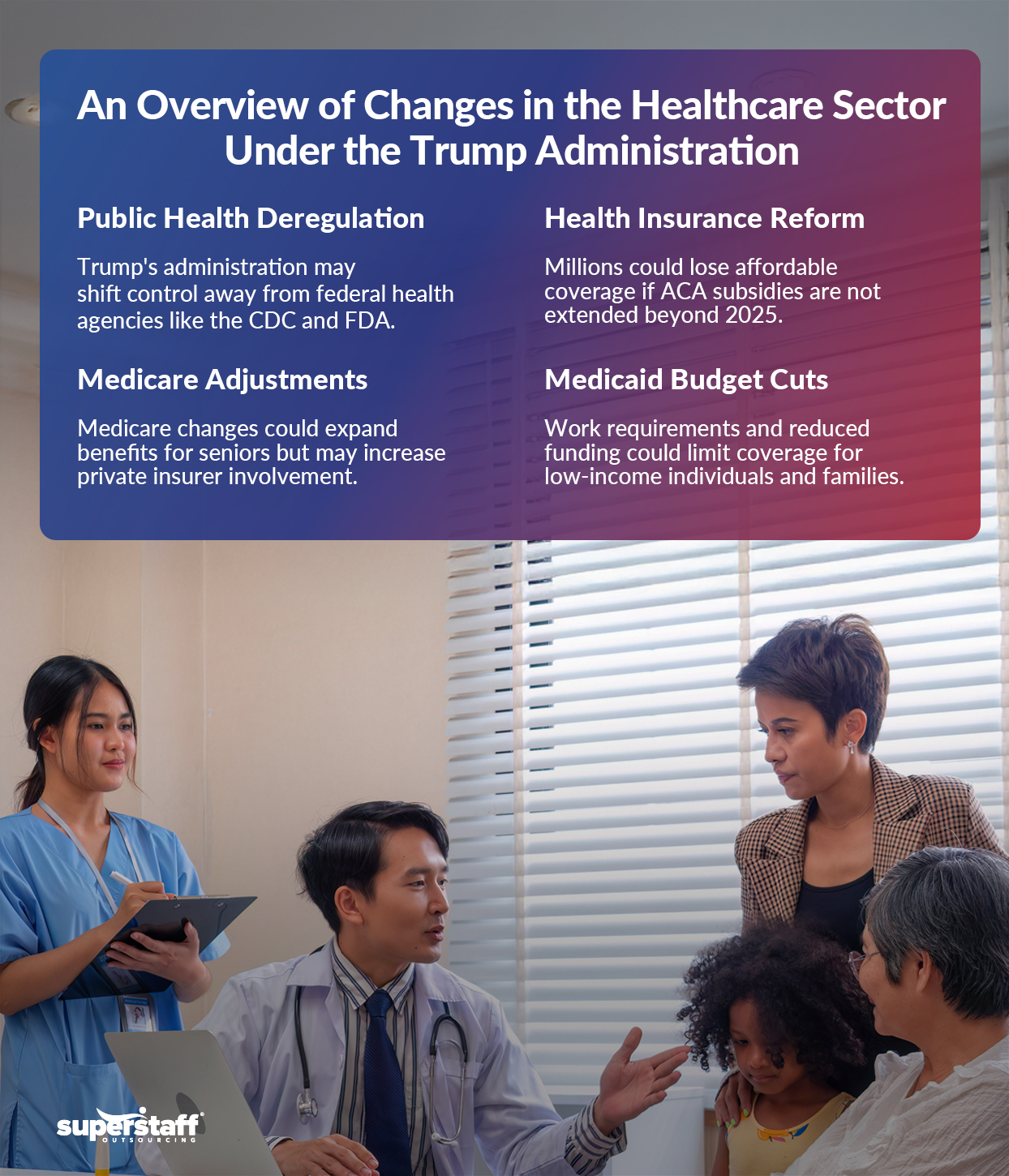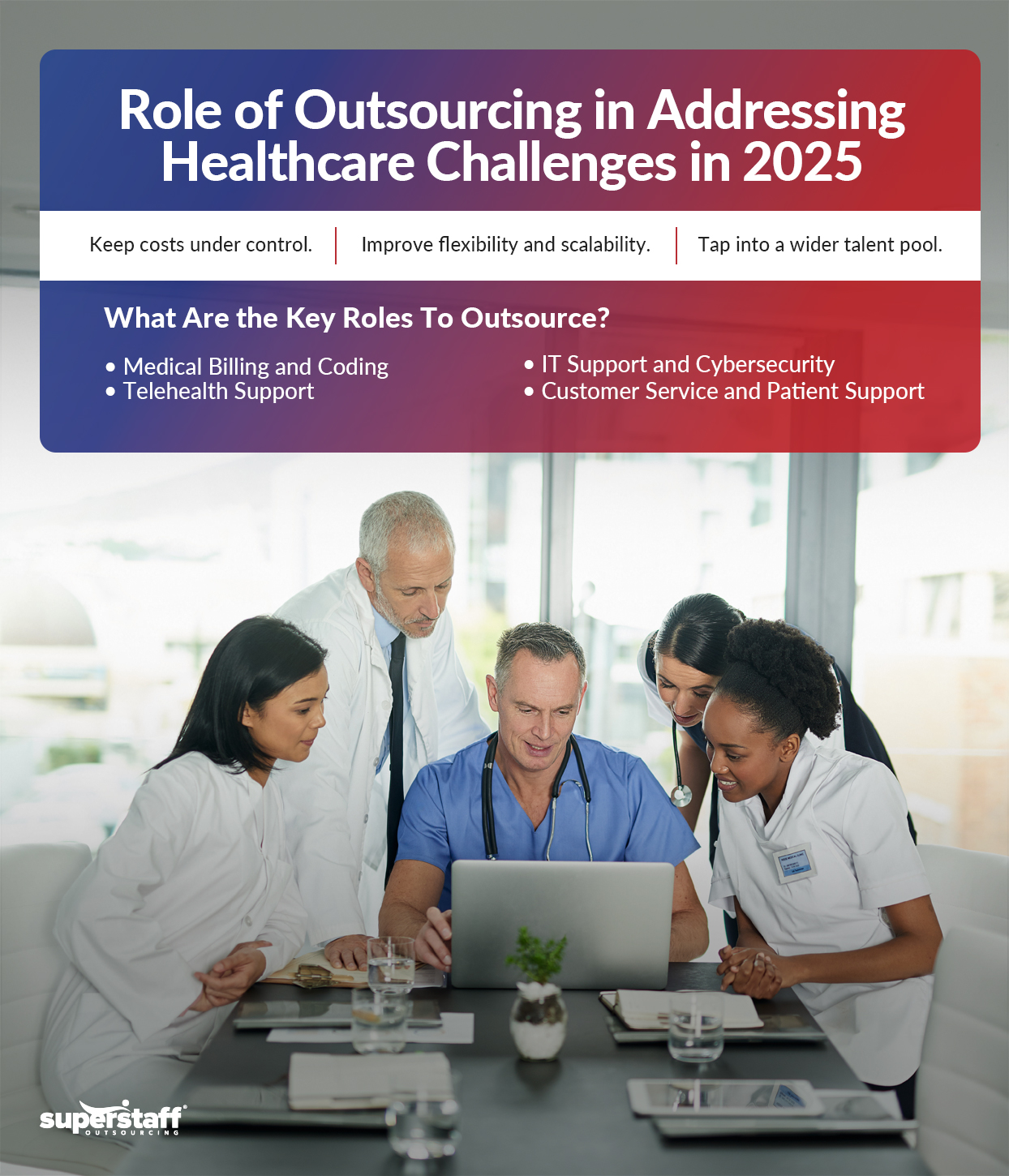
Following the election on November 5th, the United States will soon welcome a new administration under President-elect Donald Trump. During his campaign, the Republican candidate spoke little about healthcare policy but hinted at potentially massive changes affecting everything from the Affordable Care Act (ACA) to Medicare and Medicaid.
What will healthcare under Trump look like? The Republican’s potential second term raises critical questions about the direction of industry-wide policy. Understanding these possible changes is crucial for healthcare providers, policymakers, and everyday Americans navigating future uncertainties.
This blog explores how Trump’s leadership could reshape healthcare in America. We’ll focus on potential challenges in public health initiatives, insurance regulations, and Medicare adjustments and how strategic outsourcing can help healthcare providers navigate these changes efficiently and sustainably.
A Look Into Potential Changes in Healthcare Under Trump
What could healthcare look like under Trump’s presidency? The stakes are high, and the impacts are far-reaching. The president-elect has hinted at policies affecting public health regulation, health insurance reforms, Medicare adjustments, and potential Medicaid budget cuts. Here are just a few of the possible impacts the Trump presidency may have on the healthcare and insurance sector:

Public Health Deregulation
One massive change expected from the incoming Trump administration is the possibility of public health deregulation. This will shift control away from federal health agencies like the CDC and FDA and create a more market-driven system. Industry experts foresee this change to alter the healthcare policy landscape by reducing federal oversight and regulatory burdens.
Public health deregulation’s primary advantage is fostering innovation and competition, particularly for private healthcare companies. Decentralizing control can also enable states to create and execute tailored healthcare policies that meet their citizens’ unique needs, allowing for more significant market localization. The new administration plans to emphasize budget-focused proposals to lower healthcare expenditures while maintaining quality of care.
However, the main disadvantage of this approach is that it creates a more fragmented and uncertain regulatory environment for healthcare providers. For instance, appointing figures like Robert F. Kennedy Jr., known for vaccine skepticism, could alter public health policy focus. This could undermine trust in scientific consensus and potentially increase preventable disease rates.
Health Insurance Reform
According to the Centers for Medicare and Medicaid Services, more than 20 million Americans received needed health insurance through the Affordable Care Act (ACA) in 2024. However, the ACA’s future remains uncertain under the Trump administration, with industry experts seeing modifications as more likely than a full repeal.
Changes may include reduced ACA marketing funding, altered risk pools impacting those with preexisting conditions, and a return to short-term plans. Cutting ACA budgets will also mean millions of Americans could lose affordable healthcare coverage if enhanced premium subsidies expire, raising the uninsured rate.
The ACA subsidies, which increased the availability of medical services for many families in need, will expire at the end of 2025. Originating during the 2021 American Rescue Plan, the ACA extended the number of U.S. citizens eligible for subsidized healthcare, allowing many middle-class Americans to access needed medical assistance without incurring too much debt.
If the subsidies are not extended by the expiration date, the Congressional Budget Office estimates that about four million people will lose their healthcare coverage by 2026. They also foresee enrollment continuing to fall in the following four years, reaching as low as 15.4 million Americans. Without the subsidies, U.S. citizens will have to pay significantly more for their premiums, averaging an over 75% increase.
Medicare Adjustments
Beyond public health deregulation and health insurance reform, the Trump administration is also expected to make adjustments to Medicare. The President-elect’s proposed changes include improving telehealth access and expanding benefits for senior citizens with chronic conditions but may also increase private insurer involvement.
With private insurers potentially gaining more control over Medicare, coverage quality and accessibility may be impacted, especially for Americans relying on government assistance. Although the President-elect has not provided specific details for his plans to “strengthen” Medicare, policy experts believe that the new administration could manage costs by incentivizing more seniors to choose Medicare Advantage (MA) plans or changing the law to allow older adults to contribute to health savings accounts through Medicare.
Though specifics remain vague, the new administration is also expected to boost telehealth access and benefits for chronic conditions. Trump’s campaign also included a proposal to create and implement tax credits for long-term caregivers. This could support them in their daily responsibilities and, by extension, help the elderly patients and people with disabilities under their care.
Medicaid Under Pressure
While President-elect Trump has vowed to protect Medicare and support home care through tax credits, he has not expressed the same sentiments toward Medicaid. Providing coverage for lower-income Americans and people with disabilities, Medicaid faces potential budget cuts and stricter eligibility requirements under the new administration.
Many industry analysts foresee Medicaid spending cuts, which could help finance the extension of tax breaks that expire at the end of 2025. The proposed caps on federal contributions may also reduce state funding, impacting millions who rely on Medicaid programs to access needed healthcare assistance.
Some possible changes to Medicaid include work requirements for beneficiaries. The new administration also plans to revamp the program’s funding and cap federal allotments to states, limiting coverage for many low-income individuals and families nationwide.
Current Challenges in Healthcare Under the New Administration
Having discussed the possible changes the new administration may implement for the medical sector, let’s talk about the challenges facing healthcare companies. Some obstacles your business can expect in 2025 include navigating regulatory changes, uncertainty over the Affordable Care Act (ACA), increased reliance on private insurers in Medicare, funding cuts for Medicaid, rising operational costs, and potential workforce shortages. Let’s break these down one by one:
Regulatory Changes
As the U.S. welcomes a new administration, the only certainty will be change. Policies will be tweaked, budgets will be cut, and widespread reforms are likely. To thrive in this era of disruption, healthcare providers will need to stay updated on new legislation, pay attention to emerging developments, navigate varying regulations, and ensure adherence to shifting policies.
Affordable Care Act (ACA) Uncertainty
Potential cuts to the Affordable Care Act are another obstacle companies and individuals may face under the Trump presidency. Slashing ACA funding and outreach efforts could reduce patient coverage, keeping many Americans from accessing needed medical care while increasing uncertainty over how and when providers get paid for their services. Additionally, healthcare businesses may face higher uncompensated care costs as more individuals lose insurance.
Increased Reliance on Private Insurers in Medicare
As previously mentioned, the Trump administration may shift Medicare control to private insurers. With this expansion of Medicare Advantage, private insurance companies may gain more business. However, this move could also complicate coverage for seniors and create a more complex billing and reimbursement process for medical providers.
Medicaid Funding Cuts
In addition to adjusting Medicare, the new administration plans to cut Medicaid funding. The adjusted Medicaid program may include federal caps on state budgets and work requirements for beneficiaries. These changes are relevant to patients and medical providers. The cuts decrease patient access and coverage while increasing financial pressure on hospitals serving low-income populations.
Rising Operational Costs
Beyond navigating complex regulatory changes, hospitals, clinics, and other medical facilities could face higher operational costs under the new administration. Policy changes, new compliance requirements, and inflationary pressures combined will strain many healthcare businesses’ budgets. Balancing these costs while maintaining quality care will be crucial for medical providers to thrive in 2025 and beyond.
Potential Workforce Shortages
Aside from policies that directly influence healthcare, President-elect Donald Trump has also promised legislation that may affect businesses across industries: stricter immigration laws. According to a 2024 study, immigrants account for 16.5% of the healthcare workforce in the United States. Many medical facilities rely on these skilled laborers to fill crucial gaps in their operations, taking on nursing, administrative support, customer service, and other essential roles.
As such, the stricter immigration policies proposed by the Trump administration will have widespread impacts on the healthcare sector. Medical providers may struggle to recruit qualified healthcare staff and other vital support roles, particularly in areas with high reliance on foreign-born workers. This could impact patient care delivery and disrupt day-to-day operations.
Role of Outsourcing in the Healthcare Industry: A Strategic Solution to Navigating Regulatory Changes and Uncertainty
Now that we’ve tackled the different challenges healthcare businesses may face under the new administration, let’s talk about one potential solution: outsourcing. Working with a specialty healthcare BPO can help companies mitigate some of the challenges posed by policy changes, especially regarding cost control and efficiency.
The right outsourcing partner can help healthcare businesses adapt to the changing regulatory environment easily, strengthening flexibility and scalability while maintaining exceptional patient care. Here’s how:

Keep Costs Under Control
Over the past decades, healthcare costs in the United States have skyrocketed, leading to increased operational expenses for medical providers and lower accessibility for patients and their families. The Commonwealth Fund estimates that healthcare spending as a percentage of gross domestic product (GDP) increased from 8.2% in 1980 to an outstanding 17.8% in 2021.
Various studies attribute continually rising healthcare prices to the United States’ population growth, aging population, and increase in chronic illnesses. However, the upcoming regulatory changes and new compliance requirements under the Trump administration may drive costs up even further.
Thankfully, there is a way for healthcare companies to keep costs under control without sacrificing patient care: strategic outsourcing. Specialty healthcare outsourcing firms allow businesses to tap into broader talent pools from countries with more cost-effective living and labor costs. This will enable medical facilities to reduce operational costs and maintain service quality even during budget cuts.
Enable Medical Staff to Focus on Patient Care
In addition to helping facilities drive down costs, outsourcing can address another pressing challenge in healthcare: assisting providers to maintain quality patient care amid potential labor shortages and regulatory changes. According to a Centers for Disease Control and Prevention survey, health workers feel more burned out today than before the pandemic. Many medical staff even admit to struggling with stress, anxiety, and depression.
The same research found that the main issue contributing to healthcare worker burnout is the widespread U.S. labor shortages. With fewer staff available to take on tasks, existing employees took on additional workloads, leading to longer hours, added stress, and higher turnover rates. As a result, thousands of medical workers quit their jobs over the past few years.
Here’s the good news: the survey found that healthcare workers’ odds of burnout and fatigue decreased if they felt supported by their company, received help from supervisors, and had enough time to do their daily tasks. One effective way to help these medical staff is by lightening their workload through back office outsourcing services.
Offloading administrative support tasks to outsourced teams can significantly reduce your medical staff’s day-to-day workload. As capable remote professionals take on time-consuming tasks like scheduling, telehealth support, billing and coding, accounting, and data entry, your in-house team can focus on providing the best possible patient care. This helps staff avoid burnout while maintaining productivity and service quality.
Navigating Complex Challenges Under the New Administration? Here Are the Key Healthcare Services You Can Outsource
Having discussed the advantages of specialty healthcare outsourcing, let’s move on to the particular solutions you can delegate to a BPO partner. Various critical services can be delegated to offshore teams in an effort to improve efficiency and focus on core medical services.
Outsourcing these functions can lead to cost savings, increased productivity, and better compliance with industry standards and requirements. Here are the key roles you could outsource to navigate the increasingly complex regulatory landscape better:
Medical Billing and Coding
With the planned changes to Medicare, Medicaid, and the ACA, healthcare facilities must proactively strengthen their billing and coding processes. Proper medical billing and coding ensure that all diagnoses, tests, treatments, and procedures performed on a patient are documented and transcribed into standardized codes, enabling accurate reimbursements and payments for medical providers.
Since medical billers and coders are in charge of processing patient treatment records and insurance information, they must stay updated on the latest ACA, Medicare, and Medicaid developments. They reduce medical providers’ administrative burdens and help ensure they are paid accurately for their services. Additionally, they may coordinate with insurance claims processing specialists to help patients claim their healthcare coverage benefits.
Telehealth Support
Since the new administration plans to expand telehealth access through Medicare, healthcare companies must plan ahead and scale their remote care capabilities to meet these changing requirements. However, not all patients understand how to utilize telehealth applications, and this is where outsourcing telehealth support can be helpful.
Telehealth support specialists provide real-time guidance for patients who need help accessing, scheduling, and navigating remote care applications. Through healthcare call center outsourcing companies, patients can obtain needed assistance in setting online appointments with their preferred providers, resolving problems and concerns, and troubleshooting app issues. Telehealth support specialists aim to make the telehealth process as easy and seamless as possible for patients and their families.
IT Support and Cybersecurity
Beyond improving telehealth services, clinics, hospitals, and other medical facilities are encouraged to boost digital transformation initiatives. As healthcare operations become more automated with digital record-keeping and data collection, providers must invest in Information Technology (IT) and cybersecurity teams. These outsourced IT specialists can help streamline medical processes through innovative technologies and oversee the implementation, maintenance, and repair of the facility’s networks, systems, and software.
Combining their expertise in healthcare and technology, outsourced IT teams can adequately develop, manage, and maintain organized electronic health record systems. They stay updated on the latest cybersecurity standards, requirements, and best practices to protect patients’ sensitive data and safeguard the facility’s records. Their work helps hospitals and other medical facilities maintain operational integrity despite rising patient demand.
Customer Service and Patient Support
Finally, one outsourcing solution healthcare facilities cannot overlook is customer service. In the medical industry, customer experience is critical to providing top-notch patient care. When individuals contact your facility seeking assistance and clarification about your services and providers, a representative must always be available to answer their questions and concerns.
Through healthcare call center outsourcing, companies can provide 24/7 support across multiple platforms for patients. Since a large portion of the U.S. population includes non-English-speaking families, a BPO partner can also offer multilingual customer service to enable patients to communicate in their preferred language.
Navigating Healthcare Under Trump: Future-Proof Your Operations for 2025 and Beyond With SuperStaff
Are you ready to navigate changes in healthcare under Trump? The new administration could significantly impact the medical industry, bringing deregulation, insurance changes, and increased privatization. Healthcare companies must develop adaptive strategies to navigate these complex regulatory changes.
Through outsourcing, healthcare providers can improve their flexibility and agility, allowing them to address these challenges head-on while maintaining efficiency and service quality. To stay informed on changing healthcare policies and legislation, follow SuperStaff on LinkedIn or browse our website for more relevant industry content.
As the BPO arm of a healthcare and biopharma parent company, SuperStaff is well-versed in the complexities and nuances of the field. Let us be your outsourcing partner, and we’ll help you maintain sustainable operations and even fuel growth amid times of uncertainty.
Do you have more questions for us? Reach out for a quick consultation today!






